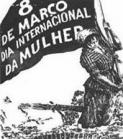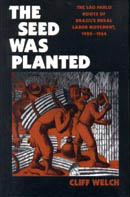More Than a Thousand Women March Against Pesticides in Ceará [3-2-11]
Over 1,000 women from the social movements of Ceará, the MST, the Movement of People's Councils and the Center of Popular Movements, made two marches to denounce the negative impacts to human health and the environment with excessive use of pesticides in Brazil and impact.
In Fortaleza, more than 600 women marched towards the Palace of the Abolition of the State Government. In Santa Quitéria, 500 women protest against the installation of mine Itataia1.

 pesticides on crops and in favour of agricultural techniques that protect their families' health.
pesticides on crops and in favour of agricultural techniques that protect their families' health.

